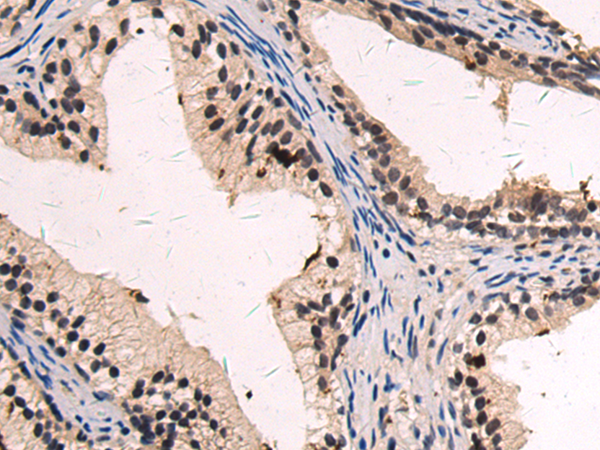
| WB | 咨询技术 | Human,Mouse,Rat |
| IF | 咨询技术 | Human,Mouse,Rat |
| IHC | 1/50-1/100 | Human,Mouse,Rat |
| ICC | 技术咨询 | Human,Mouse,Rat |
| FCM | 咨询技术 | Human,Mouse,Rat |
| Elisa | 1/5000-1/10000 | Human,Mouse,Rat |
| Aliases | Cps25; Saf19; HDPY-30 |
| Host/Isotype | Rabbit IgG |
| Antibody Type | Primary antibody |
| Storage | Store at 4°C short term. Aliquot and store at -20°C long term. Avoid freeze/thaw cycles. |
| Species Reactivity | Human, Mouse, Rat |
| Immunogen | Fusion protein of human DPY30 |
| Formulation | Purified antibody in PBS with 0.05% sodium azide and 50% glycerol. |
+ +
以下是关于DPY30抗体的3篇参考文献及其摘要概括:
---
1. **文献名称**: *DPY30 regulates epithelial-mesenchymal transition in cancer via modulating histone H3 lysine 4 methylation*
**作者**: Li Y, et al.
**摘要**: 研究利用DPY30特异性抗体,通过ChIP-seq和免疫印迹分析,发现DPY30通过调控H3K4me3水平影响癌症细胞上皮-间质转化(EMT),揭示其作为转移抑制因子的潜在机制。
---
2. **文献名称**: *DPY30 is required for stem cell differentiation by controlling H3K4 trimethylation dynamics*
**作者**: Zhang X, et al.
**摘要**: 通过CRISPR敲除结合DPY30抗体免疫沉淀实验,证明DPY30通过维持COMPASS复合体稳定性调控胚胎干细胞分化,缺乏DPY30导致H3K4me3修饰缺陷及分化阻滞。
---
3. **文献名称**: *Antibody-based profiling of DPY30 in human tissues reveals its association with neurodegenerative disorders*
**作者**: Chen R, et al.
**摘要**: 利用DPY30多克隆抗体进行组织免疫组化分析,发现其在阿尔茨海默病患者脑部异常表达,提示DPY30可能通过表观遗传失调参与神经退行性疾病进展。
---
如需更具体的文献年份或期刊信息,可进一步提供研究方向关键词进行精准筛选。
The DPY30 antibody is a crucial tool in studying the role of the DPY30 protein, a conserved subunit of the COMPASS (Complex of Proteins Associated with Set1) family of histone methyltransferases. DPY30 facilitates the enzymatic activity of these complexes, which catalyze the trimethylation of histone H3 at lysine 4 (H3K4me3), a hallmark of transcriptionally active chromatin. This post-translational modification is essential for regulating gene expression, stem cell differentiation, and cellular identity. DPY30 directly interacts with core COMPASS components, stabilizing the complex and enhancing its recruitment to target genes. Dysregulation of DPY30 has been linked to developmental disorders, cancer progression, and neurological diseases.
Researchers employ DPY30 antibodies in techniques like Western blotting, immunoprecipitation, and immunofluorescence to assess protein expression, localization, and interactions in various biological contexts. These antibodies help elucidate DPY30's role in epigenetic regulation, particularly its impact on embryonic development, hematopoiesis, and tumorigenesis. For instance, studies using DPY30-specific antibodies have revealed its tumor-suppressive or oncogenic functions depending on cellular context, highlighting its therapeutic potential. Commercially available antibodies are typically validated for specificity using knockout cell lines or siRNA knockdowns to ensure reliable detection. Overall, DPY30 antibodies serve as vital reagents for advancing our understanding of epigenetic mechanisms in health and disease.
×